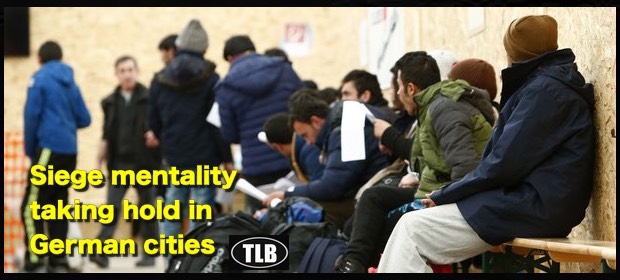
‘Like a ghetto’: Leipzig condo fences itself off from refugee center
RT
Worried about the upcoming opening of a refugee housing center in Leipzig, residents across the street decided to erect a fence around their apartment complex. Some, however, wonder who is fencing off whom, and whether the inconvenience is worth it.
While some Germans welcomed the over 1 million migrants and refugees who came to their country in 2015 with open arms, others who aren’t happy with the open door policy, like the residents of Weissdornstrasse in Leipzig, decided to take matter in their own hands – and built a 1.63-meter-high fence to keep foreigners out.

© Wir für Leipzig / Facebook
The opening of a refugee shelter in the Grunau district of Leipzig in March 2017 provides lots of anxiety among residents in the complex. More than 300 asylum seekers will be moving into an adjacent house that stood empty for over a decade, but now is being hastily renovated at a cost of €6 million.
The decision to erect the €20,000 see-through barrier was made during the annual residents’ meeting in summer. But now once the wall has been erected, some of the 400 people that live in the apartment complex feel like they are being trapped in a “ghetto” themselves.
“We feel like we are in the ghetto,” one tenant told Bild daily.
Another resident complained that elderly now have a more difficult time reaching their flats as they have a “detour of 300 meters.”
“This is an impertinence, especially for the elderly people,” the resident said, wondering who has fenced off whom.
Leipzig is required to take 13 percent of all refugees seeking asylum in the federal state of Saxony. The state itself is obliged to receive 5.1 percent of all new refugees applying for asylum in Germany.

As the migrants keep on arriving, xenophobic sentiments grow stronger in society. Hate-motivated attacks continue to take place despite a sizeable decrease in the number of refugees who arrived in Germany last year. Around 305,000 asylum seekers came to the country in 2016, compared to 890,000 in 2015, government figures showed.
Germany recorded a total of 970 attacks in 2016 against refugee shelters, the Interior Ministry announced earlier this week. While the figure represents a 6 percent decline on 2015, German authorities have evidence that another 2,396 criminal acts have been committed against refugees last year.

On the other side of the fence, you have attacks that are increasingly being perpetrated by migrants like theft, sexual assaults and even acts of terrorism.
In her New Year’s speech, the architect of the open door policy, German Chancellor Angela Merkel, said there was “no doubt” that the recent spate of terrorist attacks that hit the country was its most challenging test.
The attack on a wine bar in the Bavarian city of Ansbach, which left 15 people wounded, was perpetrated by a Syrian  refugee, who pledged allegiance to ISIS. In Wurzburg, a knife-wielding asylum seeker from Pakistan went on a rampage on a train, wounding five on July 18, in an attack also claimed by Islamic State. And the most recent attack on Christmas market in Berlin (pictured) by a Tunisian asylum seeker saw 12 people lose their lives.
refugee, who pledged allegiance to ISIS. In Wurzburg, a knife-wielding asylum seeker from Pakistan went on a rampage on a train, wounding five on July 18, in an attack also claimed by Islamic State. And the most recent attack on Christmas market in Berlin (pictured) by a Tunisian asylum seeker saw 12 people lose their lives.
New Year’s Eve celebrations of 2015-16 seen at least 24 reported rapes and numerous alleged sexual assaults, as well as dozens of thefts in Germany, mainly in Cologne city center. There were similar incidents blamed on migrants at the public celebrations in Hamburg, Frankfurt, Dortmund, Düsseldorf, Stuttgart. Police believe that throughout Germany around 1,200 women were sexually assaulted by around 2,000 men acting in groups.
To deal with the influx of refugees Germany has launched a €40 million program on Wednesday for asylum-seekers that offers up to €1,200 (almost $1,300) to applicants who voluntarily decide to go back to their home countries.
Under the scheme, any participant over 12 years old will receive €1,200 after they withdraw their application for asylum in Germany. Rejected asylum-seekers who decide not to appeal the decision in court will be provided with €800.
************
ER recommends other articles by RT
 Find out about our great (WOW) TLB Project Membership package and benefits, add your voice and help us to change the world!
Find out about our great (WOW) TLB Project Membership package and benefits, add your voice and help us to change the world!




